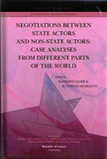This Diplomacy Dialogue policy paper argues that in the coming period, the chances of Turkish accession process moving on smoothly will be greater if Turkey can continue managing its recent economic recovery and turning it into sustainable growth over the next decade. This will eliminate or at least reduce the deep-rooted concerns on the side of the EU about accession being too costly and too destabilizing in economic and social terms. An effective and targeted deployment of economic diplomacy in this context by the Turkish government, private sector and civil society, as well as international organizations in which Turkey is a member will be of great help in allaying fears in the EU that this 73-million nation will join the faltering club as an asset and not as a liability.
Le système qui régit l’entrée des travailleurs étrangers en Suisse répond de manière insuffisante voire inappropriée à la demande de main d’œuvre dans de nombreux secteurs. Avec le problème imminent du vieillissement de la population, des solutions efficaces doivent permettre à la Suisse de maintenir sa main d’œuvre à flot. Le recours à des travailleurs de pays tiers devient dès lors l’une des seules solutions efficaces pour éviter un lent démantèlement de l’économie suisse. Cet article révèle les dysfonctionnements de la politique économique d’immigration suisse et ébauche pour les politiques publiques un système de migration circulaire fiable pour les travailleurs semi-qualifiés qui, dans un esprit de bénéfice mutuel, contribuerait substantiellement à la bonne santé du marché du travail en Suisse, tout en offrant un appui crucial au développement du pays d’origine des travailleurs et à l’épanouissement des travailleurs eux-mêmes.
The objective of this paper is to introduce the reader to the sector-specific applications of Poverty Reduction Strategy Papers (PRSPs), namely health. In order for advocacy action to be successful, the agents working for increased efficiency of the PRSP process have to know the opportunities and difficulties pertaining to these two sectors of societal development. Each sector has its own specific realities and corresponding analytical and theoretical underpinnings. What follows are overviews of key actors’ approaches to the improvement of health services delivered to the poor within the context of PRSP processes. In turn, the improved health conditions will contribute to the more sustained livelihood and poverty reduction.
In 2002, the International Labour Organization (ILO) decided to start an initiative aimed at increasing the Decent Work content of World-Bank convened Poverty Reduction Strategy Papers (PRSPs). The ILO Governing Body concluded its consideration of work in this area in March 2008. This present paper reviews the ILO experience from a partnership-building and development diplomacy point of view. The paper argues that, while significant progress has been achieved, there is a need to take the process one step forward in order to trigger a significant reframing of the PRSP debate and a shifting of its boundaries. This step will involve a partial repositioning of the ILO’s partnership building within the PRSP process and an effort to move beyond the traditional tripartite constituency of the ILO and build more systematic alliances with other segments of the national civil society as well as global poverty reduction advocacy groups.
 Today's world has gone beyond state-to-state negotiations. While these traditional forms of engagement still exist, the more rapid developments have occurred at the boundary of social and political conflicts. The State's strict jurisdiction over diplomacy as a tool for conflict resolution is being increasingly challenged by economic actors and civil society actors. This new overlapping of convergent and divergent interests between these multiple actors is the focus of the book.
Today's world has gone beyond state-to-state negotiations. While these traditional forms of engagement still exist, the more rapid developments have occurred at the boundary of social and political conflicts. The State's strict jurisdiction over diplomacy as a tool for conflict resolution is being increasingly challenged by economic actors and civil society actors. This new overlapping of convergent and divergent interests between these multiple actors is the focus of the book.
